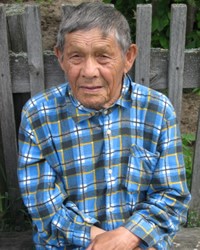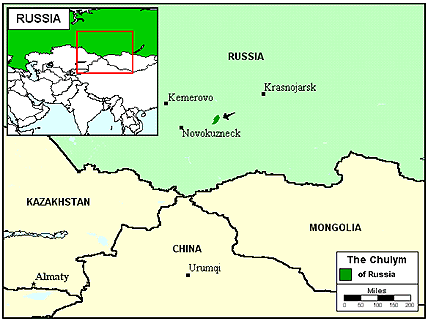The Chulym have lived in the Chulym River Valley in South Central Asia since the late 1500s when their ancestors were forced out of the Western Siberian Tatar territory. Once settled in the Chulym River Valley, they intermingled with other Turkic peoples and eventually become the group known as the Chulym or Chulym Tatar.
Because 1,200 miles of waterway separates the Chulym from other Siberian Tatar groups and they are now part of the Khakass tribal system, they developed a distinct dialect of the Tatar language. Unlike some other groups, the Chulym population cannot be identified as a cohesive group either by their language or ethnic background.
Vast forests originally provided the Chulym with all they needed to live - animals for meat, furs, and hides, fish and cedar-pine nuts for other foods. However, in the 1760s, the Russian government began construction of the Moscow-Siberian highroad, which cut across the Chulym steppe. The new road opened the way for hundreds of thousands of Russians to pour into Chulym territory and establish their own claims on the land. The Russian settlers slashed and burned huge tracts of forest to create land for agriculture and villages.
The loss of the forests destroyed the Chulym's traditional way of life. Some retreated north into marshy woods, some hired out as laborers to the Russians, and others were forced to harvest the trees that had sustained them - trees that were then used as fuel for Russian steamships.
There are very few Chulym Tatars today. They do the best they can to blend in with the Russians who live nearby, working in sawmills, tanneries and factories together. Few if any speak their language; they are now Russian speakers.
Although most Russian Tatar are classified as Sunni Muslim, the Chulym retain the shamanistic beliefs held by Tatars before Islam came their way. Shamanists believe in an unseen world of gods and demons, a belief probably influenced by their close association with the Khakass people. At one time the shaman (priest or medicine man) was considered a healer, religious leader and philosopher. Because the Chulym believed evil spirits “captured” sick people, the shaman performed elaborate rituals that included shaking a rattle to make noise and waving a kerchief to scare away the evil spirits. He (or she) also offered a propitiatory sacrifice of soup and a sheep as part of the belief that the shaman descended to the "underworld" to talk the evil spirits into “letting the soul go.” The shamanistic practices were always accompanied by a blood sacrifice. While neither Christianity nor Islam succeeded in ousting shamanism entirely, the practice seems to have disappeared in recent decades.
Russia has repeatedly exploited both the land and the people in this area. They have stripped the land of natural resources, trampled and misused the environment, and forcibly relocated the people. The government encourages Chulym parents to put their children in distant boarding schools, and many that leave do not return.
Conditions among the minority peoples in northern Russia are below the rest of the Russian population. Nuclear testing in their area has caused infant mortality to skyrocket. In some areas life expectancy is only 45 years. The Chulym do not have adequate health care, shelter or transportation. They live on a subsistence diet of potatoes and bread and lack safe drinking water. Electricity is often not available.
Pray for the Lord to provide for the needs of the Chulym Tatar people as a testimony of his goodness.
Pray the Chulym Tatar will soon have electricity, clean running water, schools and hospitals.
Pray there will soon come a day when Chulym Tatar disciples will disciple others.
Pray for the Chulym Tatar people to have the spiritual hunger it takes to seek and find Christ no matter what the cost.
Scripture Prayers for the Tatar, Chulym in Russia.
https://en.wikipedia.org/wiki/Chulyms
https://en.wikipedia.org/wiki/Siberian_Tatars
https://en.wikipedia.org/wiki/Indigenous_peoples_of_Siberia#Turkic_peoples
| Profile Source: Joshua Project |











